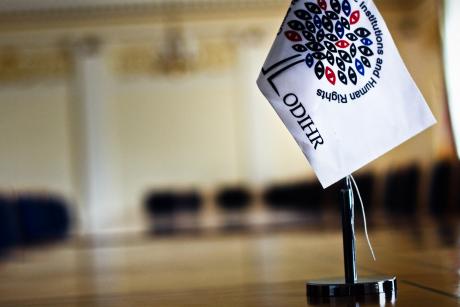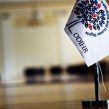
Will Russia Allow OSCE’s ODIHR to Observe Elections Again?
Publication: Eurasia Daily Monitor Volume: 8 Issue: 187
By:

For almost eight years, Russia has not allowed OSCE’s election-observation agency, the Office for Democratic Institutions and Human Rights (ODIHR), to observe parliamentary and presidential elections in that country. Russia’s next elections are scheduled to be held on December 4, 2011 for the Duma, and in March 2012 for the presidency. ODIHR is negotiating with Moscow over the conditions of a possible return to Russia for these elections.
Under both presidents, Vladimir Putin and Dmitry Medvedev, Russia has sabotaged the OSCE’s performance of core tasks, including that of observing elections through its specialized institution, ODIHR. The Kremlin last allowed OSCE/ODIHR to observe the Duma elections in 2003 and the presidential election in 2004. After that, Moscow prevented ODIHR from observing the December 2007 Duma elections and March 2008 presidential election. In both cases, Russia imposed heavy restrictions on the observers’ numbers and access, premeditated to disable the missions. ODIHR tried to improve such conditions by negotiating until the last moment, but was forced by Moscow’s stonewalling to desist from both missions.
Moscow cannot use its veto power within the OSCE against ODIHR. The Warsaw-based ODIHR has the status of an independent OSCE institution, not subordinate to the organization’s Permanent Council, and thus immune to Russia’s political veto. Consequently, the Kremlin is resorting again to administrative obstruction. It seeks to compel OSCE/ODIHR to choose between sending a small short-term mission, thus compromising the quality of its observation and findings, or giving up under duress as in 2007-2008.
ODIHR has asked Russia to accept a delegation of 260 observers, including 60 long-term (to arrive four weeks before the balloting date) and 200 short-term observers (to arrive several days ahead of that date). This number falls below OSCE/ODIHR’s 460 observers at the December 2003 Duma elections and 336 at the March 2004 presidential election –the last ODIHR-observed elections in Russia (OSCE press releases, December 7, 2003, March 14, 2004).
Under its current Director, Janez Lenarcic (a Slovene diplomat), ODIHR has apparently decided to lower the observers’ number as a gesture of political appeasement. “In light of [Russia’s] long-standing concerns surrounding the numbers, we decided to come up with this number,” Lenarcic was quoted as explaining to Russia’s Foreign Minister, Sergei Lavrov, and other officials recently in Moscow. At least, Lenarcic declared any further reduction in the mission’s manpower to be “non-negotiable” (The Moscow Times, September 15).
ODIHR’s negotiating counterpart is Vladimir Churov, head of Russia’s Central Electoral Commission (CEC), who is known for his close ties with Putin since they had worked in St. Petersburg’s city hall together (Russia Beyond the Headlines, August 29). According to Churov, Russian authorities are prepared at this point to allow a total of 500 election observers, including those from OSCE, the Council of Europe’s Parliamentary Assembly (PACE), and several bodies of the Commonwealth of Independent States (CIS). Within that overall number, Moscow would only accept up to 100 from ODIHR. Moreover, Russia wants numerical parity between observers from the OSCE and those from CIS bodies (Kommersant, Vedomosti, September 15; Russia Profile, September 22; Interfax, October 9).
Clearly, Russia seeks to draw the OSCE via ODIHR into a bargaining process, exclude long-term observers, and prune down the short-term observers’ number to a symbolic level. Moscow first demonstrated these tactics successfully in the run-up to the 2007 elections. In the negotiating endgame, Russia agreed to accept merely 70 observers from ODIHR; and delayed the issuance of entry visas, so as to minimize the duration of their presence in Russia. ODIHR was forced to desist from the mission altogether, rather than go along with a farce. That decision by ODIHR’s then-Director, Christian Strohal (a senior Austrian diplomat), met with broad understanding and approval within the OSCE.
Small delegations from PACE and OSCE’s Parliamentary Assembly were allowed to observe Russia’s 2007 elections, and they issued critical assessments. The then President Putin famously dismissed them as fit to “teach women how to make borsht” (Interfax, February 15, 2008). PACE and OSCE’s PA will again observe the December 2011 elections with small delegations. Moscow, however, deems ODIHR particularly irritating because the latter’s observer teams are larger and more intrusive than other teams, spend a longer net time on mission, are comprised of experienced professionals, publish detailed technical assessments with recommendations for improving the process, and offer follow-up assistance.
Russia is far more refractory to international observation of its elections, compared with most of the countries it formerly ruled. Kazakhstan, for example, took the initiative of asking OSCE/ODIHR to deploy the largest possible number of election observers (ODIHR alone eventually deployed some 400) for Kazakhstan’s April 3, 2011 presidential election (see EDM, April 4). Last year, Ukraine and Belarus each also welcomed hundreds of OSCE/ODIHR observers for their respective presidential elections.
At the latest CIS summit, held in September in Dushanbe (Interfax, September 4), President Medvedev summed up Russia’s objections to international observation of elections, zeroing in on ODIHR. Medvedev complained that ODIHR deploys “huge numbers” of election observers to CIS countries (though not to Russia anymore), instead of balancing those numbers evenly between east and west. Medvedev regards this as “discrimination,” “bias,” and “double standards” on ODIHR’s part. By comparison, election observers from the CIS Interparliamentary Assembly “are working more successfully, more effectively serving to strengthen democracy,” in Medvedev’s view. Most CIS countries would disagree, however. Most of them continued cooperating with ODIHR throughout the years when Russia refused to do so.




